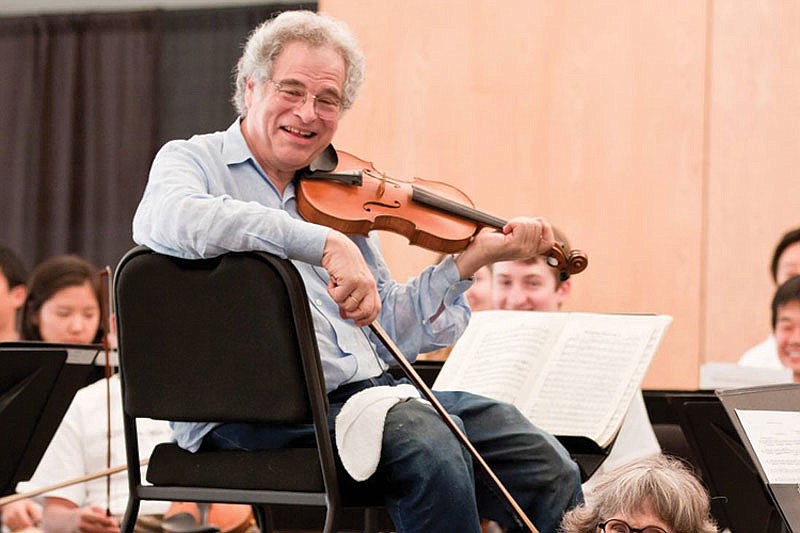- April 26, 2024
-
-
Loading

Loading

Fear.
It’s the only feeling Toby Perlman, wife of violinist Itzhak Perlman and founder of Perlman Music Program (PMP), thinks of when she recalls her experience as a violin student.
“It makes my heart start beating faster, and my breath gets shorter, remembering all those answers I didn’t have to all those questions, and (having) the feeling of not being as good as (they wanted me to be),” Perlman says during a phone interview from her New York home.
That learning experience is the reason the 70-year-old founded PMP, a seven-week intensive music training and mentoring program for talented, young string musicians in East Hampton, N.Y. The program also offers a two-week winter residency in Sarasota.
Perlman studied violin from an early age, and continued her studies at The Juilliard School when she was 17 years old. Because of her natural talent, much what she was studying was clear to her, but the rest of it became a source of psychological trauma.
“I was a slow student, a poor student and I really struggled,” she says. “And I feel that a big part of that struggle was unnecessary.”
Perlman now believes that if a talented student doesn’t understand a concept, the problem lies in the way that student is taught.
“I always thought to myself, ‘If I could have it my way …’” she says of her career as a student.
And If she could have had it her way at Juilliard, when a student wasn’t grasping the concept, the teacher would have explained it slower or in an alternative way. Holding the teacher responsible when it didn’t click for a student became Perlman’s concept for an ideal music school.
Perlman’s gears continued to turn after she became a mother of five and was looking for the perfect summer music program for her children. It was then that she realized the need for the kind of school she’d been creating in her mind.
So, in the spring of 1993, when she was given the opportunity to found a school, all the components were already worked out.
“I didn’t skip a beat,” she says. “I said, ‘Oh, a school? I’ll run a school and here’s the design for it.’ And I just (drew it up for them) at that meeting.”
She had been invited to attend a meeting with a group of people who wanted to found a music festival. She attended to be polite but it wasn’t until someone mentioned having a school attached to the festival that she became interested.
The first Perlman Music Program took place August 1993, on the acreage of a kid’s camp where the windows didn’t have screens, rehearsals and performances took place in a dining room, and there were mosquitoes and snakes — Perlman smiles as she tells the story of the first year.
“It was difficult, but we were all so enthusiastic,” she says. “Now we have a beautiful campus and we really are lucky; we are so lucky.”
The program for students ages 12 to 20 is similar to the inaugural year as far as faculty and student size, but it’s now a seven-week training and mentoring program.
In 2003, David Klein, husband to one of PMP faculty, suggested the school hold a winter residency in Sarasota.
“He felt Sarasota was a cultural mecca … (with) all kinds of really top-notch cultural activities,” she says, “And the thought was that it was fertile ground for this program.”
Perlman attributes Klein for getting the Sarasota program on its feet, but the Perlmans jumped on board as soon as the idea was piched. Itzhak Perlman had performed many times at the Van Wezel.
The students who attend The Perlman Music Program Winter Residency at USF Sarasota-Manatee’s campus are the students who were previously auditioned and accepted into the summer program.
Toby Perlman makes special effort to get to know the 36-to-40 students that attend PMP.
“I go to lunch and can tell who had a rough morning, who had a good morning and who practiced without success,” she says. “I’m able to keep my finger on each kid.” And if a student isn’t getting it, Toby Perlman looks to her faculty.
Each student has a fellow, or mentor, and there are fellows’ meetings daily to discuss the student’s progress and to keep tabs. The nurturing program fits the mold she would have wanted during the time of her musical education.
Perlman has made it her mission to ensure these students have the opposite experience she had studying violin. In fact, her life revolves around the success of PMP’s students. So much so, that her daily routine is to sleep, PMP and eat (if she’s not so busy she forgets to eat). A few weekends ago, she worked all Saturday then went straight to PMP’s alumni’s concert.
“We don’t have time to see our friends, because our lives are filled with PMP,” she says. “If you love what you do, it’s not so bad.”
IF YOU GO
The Perlman Music Program Sarasota Winter Residency
More than 20 musical events including orchestra and chorus rehearsals, master classes and Q&A sessions are open to the public.
When: Various times from Dec. 23 through Jan. 4
Where: USF Sarasota-Manatee, 8350 N. Tamiami Trail
Cost: Free to $5
Info: Call 955-4942 or visit PMPSuncoast.org for more information.